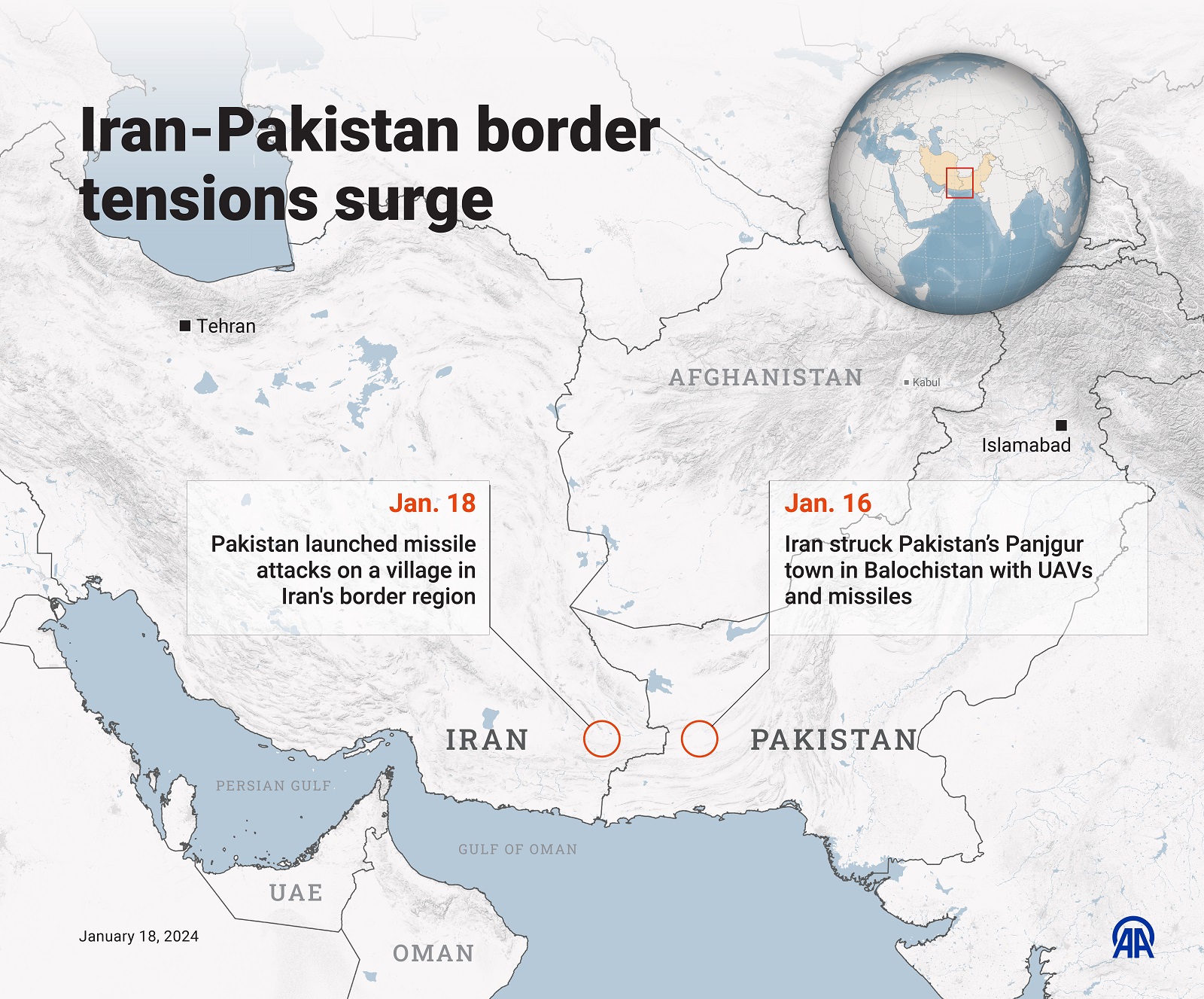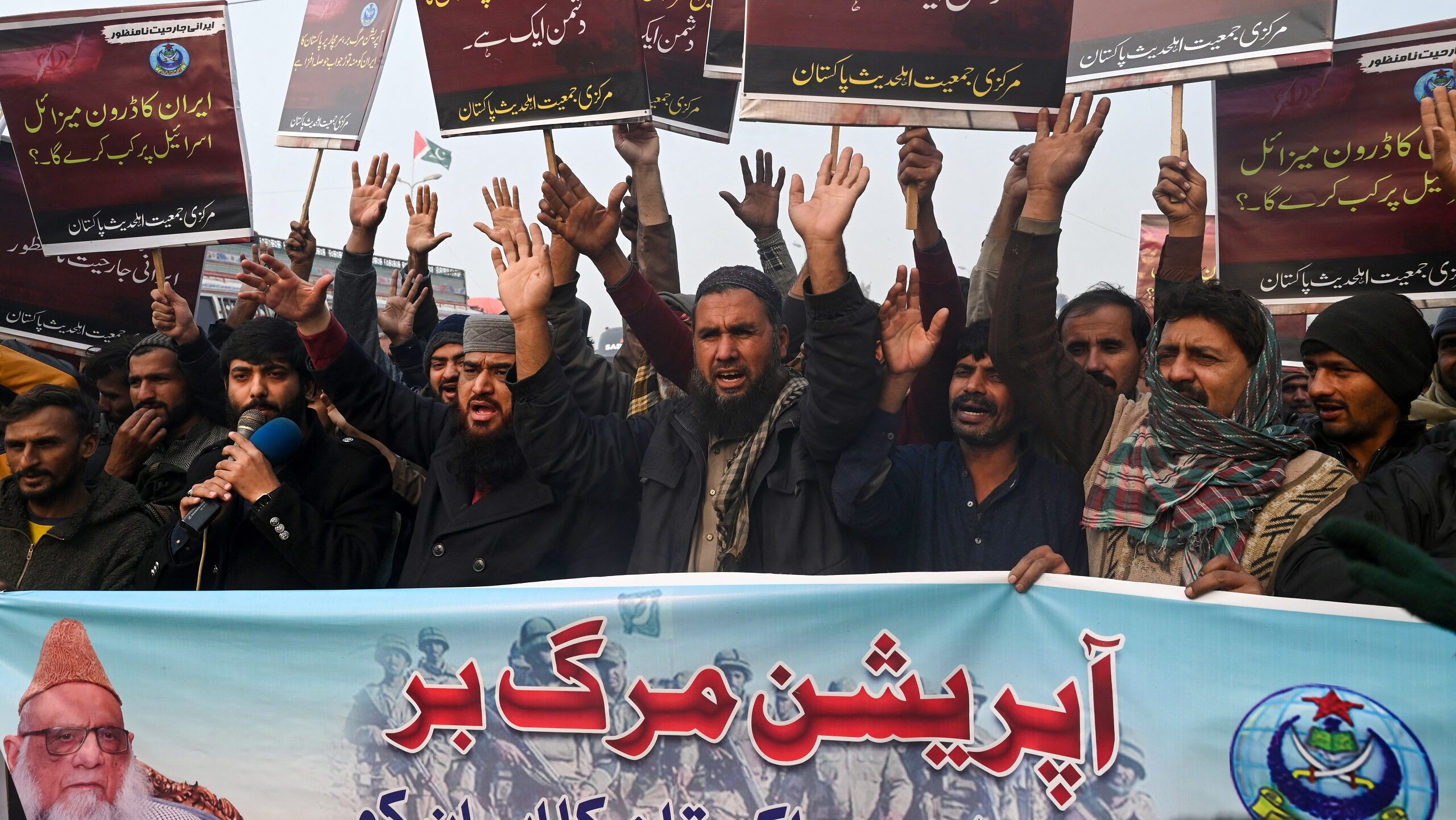Islamabad Strikes Back: Pakistan Targets Terrorist Hideouts in Iran
The South Asian neighbors furthered their diplomatic standoff over violent Baloch separatists operating inside their borders
[Islamabad] Pakistan launched a fierce counteroffensive against Iran on Thursday in response to an Iranian attack on Pakistan on Tuesday that Islamabad claimed killed two children.
According to a provincial source cited by Iran’s official Islamic Republic News Agency, “multiple explosions have been heard in numerous regions around the city of Saravan” by Iran’s southeast border.
Pakistan Air Force jets struck targets about 30 miles into Iranian territory on Thursday morning, destroying seven terrorist hideouts around the city of Saravan in the attack.
Saravan, the capital city of Iran’s Sistan and Baluchestan province, borders Pakistan.

(Elmurod Usubaliev/Anadolu via Getty Images)
On Tuesday morning, Pakistan’s Foreign Ministry announced that Pakistan had carried out “a series of highly coordinated and specifically targeted precision military strikes against terrorist hideouts in Sistan and Baluchestan province of Iran.” “Several terrorists” were killed in the attack, the ministry said.
Unofficial sources claimed that at least 20 terrorists, including commanders, were killed in the strikes. Iran confirmed the death of seven non-Iranian nationals.
The operation was code-named Marg Bar Sarmachar, or “death to terrorists.”
The precision strikes were carried out using killer drones, rockets, loitering munitions, and stand-off weapons. Maximum care was taken to avoid collateral damage.
In a Thursday afternoon press release, the Pakistan Armed Forces media wing said that “the precision strikes were carried out using killer drones, rockets, loitering munitions, and stand-off weapons. Maximum care was taken to avoid collateral damage.”
The press release said that Pakistan’s military is “in a perpetual state of readiness to ensure the safety of Pakistan citizens against acts of terrorism” and called for “dialogue and cooperation” between Pakistan and Iran going forward.
An Islamabad-based source told The Media Line that the strikes targeted training camps of two Baloch separatist groups designated as terrorist organizations.
Mumtaz Zahra Baloch, spokeswoman for Pakistan’s Foreign Ministry, said that Pakistan respects “the territorial sovereignty of Iran, but cannot allow any action against us.” She added that Pakistan had concrete evidence of terrorists operating in Iran and that a lack of action against the terrorist organizations had allowed them to continue “to spill the blood of innocent Pakistanis with impunity.”
Baloch insisted that Pakistan protect its sovereignty while striving to address common challenges with Iran through “dialogue and cooperation.”
Pakistan’s retribution came a day after Iran attacked the Panjur, Pakistan hideout of Jaish ul-Adl, a Baloch separatist group recognized as a terrorist organization by the US and Iran. Iran also launched strikes on Iraq and Syria hours before attacking Jaish ul-Adl in Pakistan.
In the wake of the attack, Pakistan has directed its Civil Aviation Authority to strictly monitor all inbound flights, particularly from Iran. All air traffic controllers have been instructed to collect the details of every inbound flight from the western side of the country.
However, Pakistani airspace is open for Iranian commercial flights.
Terrorists killed in Thursday’s attacks are said to belong to the Balochistan Liberation Army (BLA).
BLA has waged a violent insurgency against security forces and state-owned targets, mainly in Pakistan’s Balochistan province, for nearly two decades. Its leadership and training camps are believed to be in Iran and Afghanistan.
Pakistani officials believe that India is backing and funding BLA terrorists to counter Chinese influence in the region.
Balochistan is rich in natural gas—the biggest contributor to the local economy—in addition to oil, copper, and gold. It borders the Punjab, Sindh, and Khyber Pakhtunkhwa provinces as well as Afghanistan and Iran.
The Baloch people are an ethnic group from South and Southwest Asia. About half of the world’s 10 million Baloch people live in Pakistan’s southwestern province of Balochistan, which is the country’s largest province by area.
Baloch ethno-nationalist groups have been fighting since at least 2004 to establish a homeland for the Baloch people in a territory currently located across Pakistan, Iran, and Afghanistan.
Baloch nationalists initially wanted a share of the provincial resources but have since been fighting to achieve independence.
BLA, which is designated as a terror group by the EU, US, UK, and Pakistan, has carried out numerous attacks against the Pakistani military, Pakistani civilians, and Chinese nationals working on Chinese infrastructure projects in Pakistan.
Both countries ought to resolve the issue diplomatically
Abdul Basit, Pakistan’s former ambassador to Germany and high commissioner to India, told The Media Line that Iran’s attack on Jaish ul-Adl led to resentment among Pakistanis. “Both countries ought to resolve the issue diplomatically,” he said.
Adeeb Uz Zaman Safvi, a Karachi-based retired Pakistan Navy captain and defense analyst, told The Media Line that Iran and India have been collaborating to weaken Pakistan. He pointed to the arrest of Kulbhushan Jadhav, an Indian national who was arrested in Balochistan on charges of spying and terrorism.
“Jadhav has previously acknowledged providing Baloch rebels in Pakistan with financial support as well as training resources,” Safvi said.
He called Pakistan’s targeting of BLA “a defensive move.”
Jawad Sohrab Malik, special assistant to the prime minister for overseas Pakistanis, told The Media Line that Pakistan’s retaliatory strike “is quite legitimate.”
“The legal and proportionality principles guided the execution of the retaliatory measure,” he said.
China urged Pakistan and Iran to use caution in the present situation.
The Chinese Foreign Ministry asked both countries to desist from taking any measures that could escalate the situation and requested that the countries cooperate to uphold peace and stability.
Afghanistan has also expressed its concerns over the hostilities between Pakistan and Iran.
Abdul Qahar Balkhi, a spokesperson at the Afghan Foreign Ministry, told The Media Line, “The region has witnessed peace and stability after decades. We request both neighboring countries to conduct diplomatic dialogues to resolve the issues.”
Pakistan’s caretaker Prime Minister Anwar ul Haq Kakar is believed to have cut short his visit to the World Economic Forum in Davos, Switzerland following Pakistan’s strikes on Iran.
Pakistan’s Foreign Ministry said that Kakar made this choice in light of the rapidly evolving situation.


